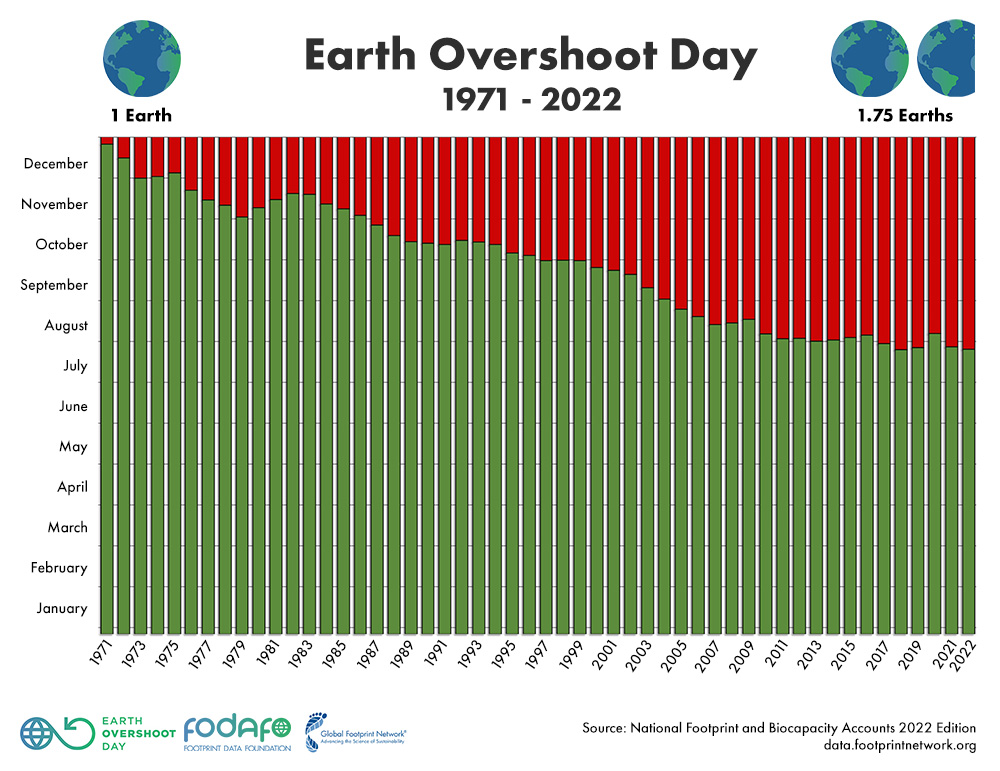 This year, Earth Overshoot Day lands on July 28. It gets earlier and earlier, a clear consequence of global economic growth. This can’t go on. Click image to learn more.
This year, Earth Overshoot Day lands on July 28. It gets earlier and earlier, a clear consequence of global economic growth. This can’t go on. Click image to learn more.
We are currently seeing renewed calls from leading politicians for a focus on “growth”, by which they mean economic growth, as measured by Gross Domestic Product, or GDP. The Conservative contenders are doing it, and Labour’s current leadership are too.
Yet, for a politician to advocate increased economic growth, given the evidence, they have to be ignorant, wicked or stupid. Renowned Liverpool-born, US economist, Kenneth Boulding said it clearly in the 1970s,
“Anyone who believes in indefinite growth in anything physical, on a physically finite planet, is either mad or an economist.”
Starmer, Sunak, et al. will tell you that economic growth is compatible with “net” zero carbon emissions. But they are wrong.
It is known that it is not possible to decouple economic growth from increased material and energy throughput. By “not possible to decouple”, we mean not possible to do so in absolute terms, taking account of imports, at a sufficient rate, and permanently.
Critically that means more carbon emissions, yet more resource consumption and other pollution, more land grabbing, ecological and livelihood destruction, and as reserves of resources diminish, a reducing return on investment, itself causing economic instability.
What evidence there is for decoupling suggests that:
a) it is mostly relative, not absolute (emissions etc. still rise but more slowly), and
b) where absolute it usually doesn’t take account of imports (outsourced emissions themselves) and is not sustained.
In the few cases where it seems to have been both absolute and taking account of imports, it has been transient and insufficient in relation to the cuts in throughput (e.g. emissions) needed. Moreover, it still does not take account of the hidden inflation of GDP in the rich countries by exploitation of labour in the exporting global industrial belts – that means the calculation rests on flawed metrics.
It’s not just us saying that but a substantial body of evidence that has never been convincingly challenged. It’s now a big field but the following sources are key recent ones.
Key findings are that there is no evidence of long-term absolute decoupling of economic growth from resource use either from the historical data or in more recent modelled projections for high-efficiency scenarios . Over the long-term, global gross domestic product and global unsustainable resource are tightly coupled.
Parrique, T., et al. (2019). Decoupling debunked: Evidence and arguments against green growth as a sole strategy for sustainability. European Environmental Bureau. http://eeb.org/library/decoupling-debunked
Haberl, H., et al. (2020). A systematic review of the evidence on decoupling of GDP, resource use and GHG emissions, part II. Environmental Research Letters, 15(6), 065003. https://doi.org/10.1088/1748-9326/ab842a
Vadén, T., et al.. (2020). Raising the bar: On the type, size and timeline of a ‘successful’ decoupling.Environmental Politics, 0(0), 1–15. https://doi.org/10.1080/09644016.2020.1783951
Weidmann, T., Lenzen, M., Keyßer, L. T., & Steinberger, J. K. (2020). Scientists’ warning on affluence. Nature Communications, 11(1), 3107. https://doi.org/10.1038/s41467-020-16941-y
Hickel, J., & Kallis, G. (2019). Is Green Growth Possible? New Political Economy, 1–18. https://doi.org/10.1080/13563467.2019.1598964
All that work relies on a host of primary sources.
High income countries since 1970 have been collectively responsible for 75% of cumulative excess material use. That is excess unsustainable use of the earth’s natural capital, and since 2000 that rate of usage has started to accelerate significantly. The USA is the single largest contributor to excess resource use, responsible for 27% of the world total whilst EU countries and the UK are together responsible for 25%.
Hickel, J., et al.. (2022). National responsibility for ecological breakdown: A fair-shares assessment of resource use, 1970–2017. The Lancet Planetary Health, 6(4), e342–e349. https://doi.org/10.1016/S2542-5196(22)00044-4
Hickel, J., et al. (2022). Imperialist appropriation in the world economy: Drain from the global South through unequal exchange, 1990–2015. Global Environmental Change, 73, 102467. https://doi.org/10.1016/j.gloenvcha.2022.102467
We previously debunked the widely reported claim that several countries had decoupled carbon emissions from GDP growth.
The only viable option is managed degrowth. An increasing body of work shows that, while it would be challenging to deliver (but not more than the unicorn of growth and falling emissions), it could mean a society, fair to everyone, that lived within the planet’s ecological means.
Here are some pieces that explain.
Hickel, J., et al. (2021). Urgent need for post-growth climate mitigation scenarios. Nature Energy. https://doi.org/10.1038/s41560-021-00884-9
Millward-Hopkins, J. et al. (2020). Providing decent living with minimum energy: A global scenario. Global Environmental Change, 65, 102168. https://doi.org/10.1016/j.gloenvcha.2020.102168
Nieto, J., et al. (2020). Macroeconomic modelling under energy constraints: Global low carbon transition scenarios. Energy Policy, 137, 111090. https://doi.org/10.1016/j.enpol.2019.111090
Koch, M. (2022). Social Policy Without Growth: Moving Towards Sustainable Welfare States. Social Policy and Society, 21(3), 447–459. https://doi.org/10.1017/S1474746421000361
So, to reiterate, politicians that advocate increased economic growth, given the evidence, would have to be ignorant, wicked or stupid.
By Howl Arts Collective – Flickr: tar sands, Alberta, CC BY 2.0, https://commons.wikimedia.org/w/index.php?curid=33395825





